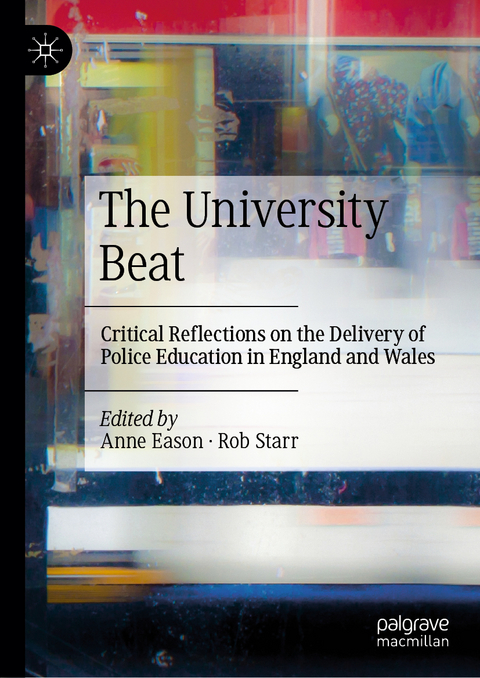
The University Beat
Springer International Publishing (Verlag)
978-3-031-68430-2 (ISBN)
This book presents critical reflections on the professionalisation of policing through the delivery of the Police Constable Degree Apprenticeship (PCDA), Degree Holder Entry Programme (DHEP) and Pre-Join degrees by HEIs in the UK. Each chapter is written by lecturers and staff from a single policing teaching team who deliver these degrees, to cover inception of the programme through to delivery and their practical reflections and insights. The chapters are underpinned with academic theories of pedagogy and topics appropriate to the delivery of material to (student) police officers which encourage critical thinking, evidence and reflection. This diverse teaching team includes academics and pracademics working side-by-side to engage and support student officers with the learning needed for 21C police officers. This book includes an outline of the UK policing model to assist readers from other countries who are interested in the learnings. It is a resource for police students, police and law enforcement leaders and overseas academics in policing, criminology, sociology and education.
Anne Eason is Associate Director of Policing, at the University of the West of England, UK, overseeing the Police Constable Degree Apprentice and Graduate Diploma. She is also Trustee of The Wheels Project, Bristol, and former Senior Probation Officer.
Rob Starr joined University of West of England (UWE), UK, as Senior Lecturer in Policing in March 2020. Prior to joining UWE he worked as a police officer within the Metropolitan Police and West Midlands Police.
Part 1: Introduction.- Chapter 1. "Rolling with resistance" The challenges of HEI in police education (Anne Eason and Rob Starr).-Chapter 2. Racial Diversity and Police Education in England and Wales (Mohammed Akinwunmi-Othman).- Chapter 3. Follow the Yellow Brick Road: a reflection on the development of police constable education at UWE, Bristol (Georgie Benford, Claudia McCready, Christian Butler, Matthew Gaunt).- Part II: Preparation.- Chapter 4. Mitigating the dual identity of police students at UWE (Anne Eason and Rob Starr).- Chapter 5. How a learner-centred approach can support and develop problem-solving and critical thinking within the police service (Eve Smietanko and Rob Starr).- Part III: Delivery.- Chapter 6. Selling the idea of 'what works' as everyday business: reconciling Evidence Based Policing with traditional tradecraft (Gary Stephens).- Chapter 7. Seven Gamification in Higher Education and Policing (Dominic McVeigh).- Chapter 8. Using the KSBs to relate academic requirements to on-the-job skills(Sarah Williams).- Chapter 9. The value of tripartite reviews and their impact on the student journey (James Barnett and Morag Burrell).- Part IV: Progression.- Chapter 10. The importance of constructive criticism and reflection (Sarah Williams).- Chapter 11. Neurodiversity - delivering inclusive learning on the Police Constable Degree Apprenticeship (Imogen Hirst).- Chapter 12. "Police don't need 'soft skills'": The place of emotional intelligence in police education(Anne Eason).- Part V: Conclusion.- Chapter 13. The future opportunities for police education in HEI (Rob Starr and Anne Eason).
| Erscheinungsdatum | 23.10.2024 |
|---|---|
| Zusatzinfo | XXI, 238 p. 2 illus., 1 illus. in color. |
| Verlagsort | Cham |
| Sprache | englisch |
| Maße | 148 x 210 mm |
| Themenwelt | Recht / Steuern ► Strafrecht ► Kriminologie |
| Sozialwissenschaften ► Pädagogik ► Berufspädagogik | |
| Sozialwissenschaften ► Pädagogik ► Erwachsenenbildung | |
| Schlagworte | College of Policing • crime prevention • evidence based policing • PEQF • police apprenticeship degree • police education • police reform • professionalisation of the police |
| ISBN-10 | 3-031-68430-3 / 3031684303 |
| ISBN-13 | 978-3-031-68430-2 / 9783031684302 |
| Zustand | Neuware |
| Informationen gemäß Produktsicherheitsverordnung (GPSR) | |
| Haben Sie eine Frage zum Produkt? |
aus dem Bereich


